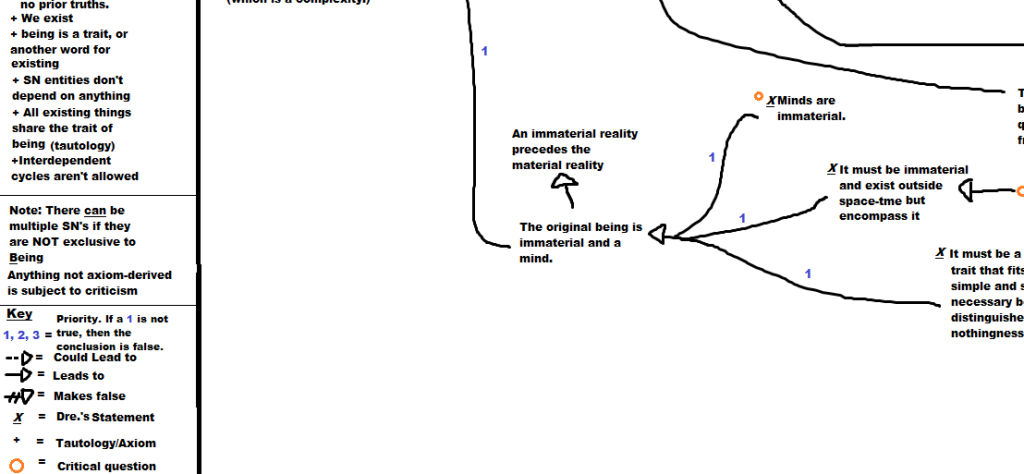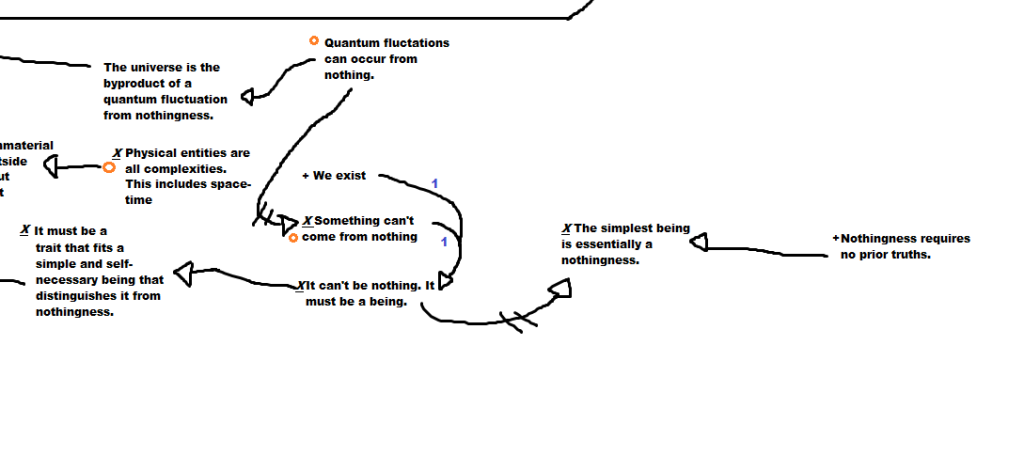I do think there is a distinction between mind and brain, but consciousness isn't my strong my point, and it's not really my interest. It's also not really relevant to the topic, because my God argument doesn't hinge on whether there is a distinction between mind and rbain.
You could argue that if minds are immaterial, then the universe may be partly comprised of immateriality. It would give you more of a basis to your claim of an immaterial realm (which is actually a central part to your argument.)
I'd be happy if you could answer my questions though.
Was this an accidental leftover from the quote?

Complexities rely on something else because they have a specific form which is necessitated by another truth. What makes a being simple is that is has no form, it essentially almost a nothingess, for nothingness necessitates no prior truths.
So it doesn’t exist in space-time (since physical objects have a form) is what you’re saying?
Being dependant on time does not mean it was actuated by time though. Time is the medium through which X actuates Y, but it isn't time itself that actuates Y.
Maybe I'm jumping into a field I'm not educated in here, but it certainly seems conceiveable that time-space could exist wothout matter.
It's conceivable, but is it realistic? That could be. Like I said earlier, the best person at present to ask on the relationship between matter and space-time in case of this debate would be a physicist. Since the question is unanswered, no conclusion can be drawn.
As for whether they're interrelated or spearate beings it doesn't really matter because it is still a complexity. The No Boundary Proposal is essentailly saying that they are all one unified compelxity, because there is no beginning to the universe, so there is no causation, everything would exist eternally. This doesn't solve the problem though of why an unecessary complexity exists as the ultimate reality, when observation of nature tells us that all complexities are actuated into existence by prior beings.
So let’s say the universe is one “unified complexity.” It’s plausible that everything is derived from one main form, or the entirety of the universe put together forms a simplicity. Your answer above is also possible. This is basically the same as the reply above.
Because a simple being essentially has to be nothingness, for only nothingness has no specific form. You can't have two nothingnesses, for that then gives it a form.
Okay, so you’re saying the simple being (
Being) is not made of the stuff of space-time (since according to you it has a form), and probably doesn’t work in accordance to its laws, right?
This is also goes back to my old self-necessity argument. You can't have two original self-necessary beings, because they would in fact be dependant on each other. Secondly, the SN being is supposed to encompass being tiself, it is supposed to be being, not a being. If you have two SN beings, neither of them is being, for there is a being that exists independent of what they encompass. This renders them both a being rather than being itself, or all being. As soon as you say the both of them are beings, then there needs to be a prior existence which is being itself to account for how these two SN beings existed, which of course makes the original being the SN one.
That’s only if you equate self-necessity exclusively with the essence of
Being. And of course, there’s nothing that says that the object of
Being even needs to exist. “Existing” or having the trait of “being” is something everything shares, but that doesn’t mean that “being” takes on its own form simply becauseit can be applied to a group of things. Take redness for example. Lots of things are red: apples, plastic cups, blood, but that doesn’t mean that
Red itself becomes its own entity.
Only if you assume that being, which when it comes down to it is just a trait and an adjective that says that something is physically there, becomes its own thing (
Being) do you end up with it becoming the simplest thing, which makes it the only self-necessary thing (because everything else would be complexities) and binds self-necessity and simplicity. Only when you turn the adjective or physical trait into its own entity do you end with the impossibility of having multiple self-necessary beings.
If I am correct about your argument making the assumption that the shared trait of being is dependent on a single entity of
Being, then I find that questionable.
Here's a an illustrative chart of Dre.'s argument and the roots of the argument as a whole (including some other arguments that were used in the debate.)
[collapse="Sorry for the pieces, Photobucket makes it unreadable at higher sizes."]
[/collapse]
So Dre., what it basically comes down to is:
Do traits have a universal embodiment that needs to exist in order for the traits to be bestowed on other beings? Is everything in space-time really a complexity? Does everything share one unifying mathematical formula or can be formulated into a universal law or theory? Is M Theory or the No Boundary Proposal correct, or is there another theory out there? Can something come from nothing, or can a quantum fluctuation appear from nothingness? Are minds immaterial?





